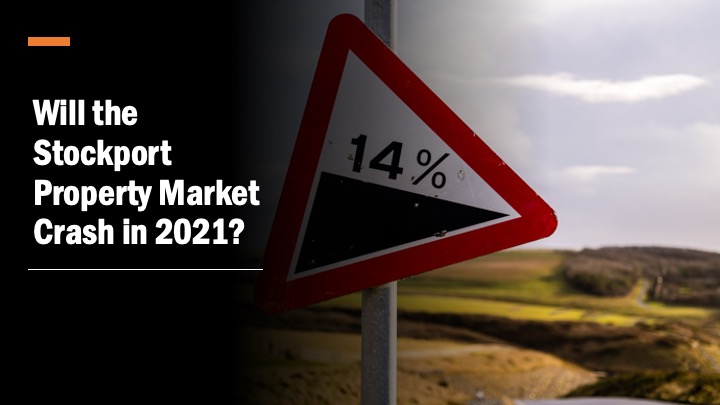…and the three reasons why it will not be the catastrophic scenario some are predicting
In the last few months, the Stockport (and UK) property market has resisted and flouted every economist’s prediction. With the economy a shadow of its former self, unemployment set to hit 11.9%, the Government on track to borrow nearly half a trillion pounds to pay for Coronavirus support packages etc., all of this has had no effect on Stockport homeowner’s enthusiasm or capability to want to move home. It highlights the influence of both the emotional impact of lockdown and the enticing appeal of saving thousands of pounds on your Stamp Duty Tax bill.
For the last few months, the Stockport property market has been akin to a surfer, riding an unexpectedly large wave. The question is, will the surfer crash down (i.e. the property market) into the rocks or will it calmly arrive at the beach unscathed? Well looking at house prices firstly…
UK house prices are 4.7% higher than they were 12 months ago according to the Land Registry, whilst in Stockport they are 4.2% higher
Looking at the data over the country, things overall are looking good for property prices. Yet it must be remembered the Land Registry data is on completed house sales and is always a couple of months behind, so this data is for house sales up to September that were agreed in the spring. Also, it does not take into account the prices being paid today on Stockport homes (as they will only show in statistics the Spring and Summer of 2021 when the sale completes).
Stockport house prices will inevitably ease in 2021
Anecdotal evidence over the last few months has suggested buyers are using their Stamp Duty savings on the price they are prepared to pay for the Stockport home of their dreams, so when the Stamp Duty holiday finishes in Spring 2021, we will see a reduction in the price Stockport properties sell for, as buyers will now have to hold back some of their cash to pay the Stamp Duty Tax.
Mortgage approvals at a 13 year high
A better statistic to judge the property market by are the number of mortgage approvals. As the vast majority of house buyers need a mortgage, that is another good place to look at the numbers as they are much more up to date than the Land Registry figures. The Bank of England recently stated 97,500 mortgages were approved last month, up from the long-term average of just over 65,400 per month. This was the highest number of mortgage approvals since September 2007, and a whole third higher than mortgage approvals in February 2020 when we had the Boris Bounce in the property market.
As a country, we are due to smash through 2019’s 524,000 total number of mortgage approvals this month, despite the fact that the property market was closed for nearly three months in the spring. It’s vital to remember, that mortgage approvals do not equate to people moving home, as many of you reading this can attest to … property sales do fall through.
I do have apprehensions that many Stockport people, buying and selling their Stockport homes and in a chain, may not be able to realise the move before the Stamp Duty rules change at the end of March 2021, as there is a massive backlog with mortgage lenders, local authorities’ and the searches, chartered surveyors surveying the property and solicitors with the legal work, all combining to slow down the house selling and buying machine.
If you are in chain at the moment, you must constantly be talking to all the parties involved and ensuring everything is focused on getting the sale complete by the end of March. You have a responsibility to get information requested back in hours, not weeks… because if you don’t, you might not get your Stockport home move through before the end of the stamp duty holiday, and without that discount, someone in your chain may pull out of the sale altogether and the chain will break.
The number of people moving home in Stockport is anticipated to
drop sharply after the Stamp Duty holiday ends at the end of March 2021
And that is probably going to be the biggest impact on the Stockport property market in 2021. Yes, there will be a slight readjustment in the prices paid after March 2021 (as mentioned above), yet a reduction in the number of people selling their Stockport home does not inevitably lead to a house price crash.
Yes, there will be a number of people who have to sell in 2021 because they have lost their jobs (i.e. ‘forced sales’). In the last two ‘Property Market Crashes’ of 1988 and 2008, there were a large number of forced sales in a short period of time (because business owners had to sell their home as their business had gone bankrupt because of the Credit Crunch, as well as people who had lost their job), increasing the supply of properties coming to the market in 1988 and 2008.
This in turn pushed Stockport house prices down as the property market was flooded with lots of property to sell in a short period of time. Yet this time, we have had the cushion/parachute of Bounce Back Loans, Furlough and Mortgage Holidays over the last 9 months.
Also, another important factor about the last property market crashes were the levels of interest rates and the amount borrowed.
Interest Rates are the key to the future
of the Stockport property market
In 1988, mortgage interest rates were an eye watering 11.5% and 6% in 2008, meaning mortgages were much more expensive compared to the 0.1% rate we have today. Also, with 77.2% of mortgagees with fixed rate mortgages, and only 1 in 21 mortgages owing more than 90% of the value of their home (and 1 in 303 mortgagees owing more than 95% of the value of their home), negative equity should not be so much an issue like it was in 1988.
This means most Stockport homeowners are in a much better place to weather the storm of 2021, than they were in 1988 and 2008
I foresee many Stockport sellers will simply wait until activity in the Stockport property market picks up again before placing their property on to the market. This means fewer properties will be placed onto the market for sale in the later part of 2021, meaning Stockport house prices will tend to hold up. The people that will be affected by less properties coming onto the market will be estate agents, solicitors and home removals people.
I also believe there will be ‘interesting investment opportunities’ to be had for Stockport buy to let in the latter half of 2021 with the potential changes in Capital Gains Tax regulations, although those won’t go on the open market, so do keep your ear to the ground and build relationships with all the letting agents in Stockport so you get to hear of the property portfolios coming up for sale (as they tend to sell ‘off market’). Again, if that’s something that interests you – do drop me a line.
So, where is the Stockport property market heading in 2021?
Well, the Stockport property market (aka our “surfer”) has seen a house price growth of 43.1% since 2009 … and this has been fuelled on the back of…
- Ultra-low interest rates mean money is cheap to borrow and so mortgage payments are low. With the Bank of England pumping £150bn into the economy in November with Quantitative Easing (QE) to add to the £725bn they have already spent on QE since 2009 – interest rates will continue to stay low for some time.
- There has been an increased demand for housing with annual net migration of 214,400 since 2009 (meaning 96,700 additional households per year have been required since 2009 just to house those people – a total of 1,063,700 households).
- The average age of death has risen by 2.1 years since 2008 in the UK. People living longer delays property from being released back onto the property ladder. For every extra year of life the average Brit lives, an extra 290,850 households are required in the UK.
None of these things have changed because of Covid.
As a country, we have only built on average 165,100 homes a year since 2009. Supply and demand shows that whilst we will probably have a turbulent choppy ride on the 2021 wave (because of the economy) our surfer (aka the property market), with long term demand for housing outstripping supply since the 1980’s, will continue to ride the wave (probably not as large as it has been in 2020) as the ultimate long-term outlook for the property market in Stockport looks good.



